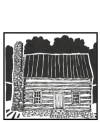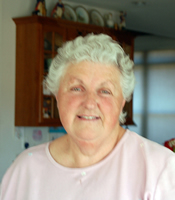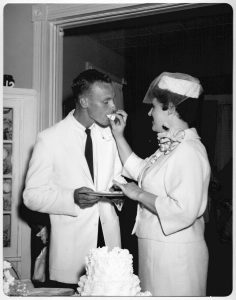From an interview by Susan Freis Falknor, February 21, 2009
Winnie Kelley: Reminiscences of Bluemont and “Aunt Freddie” Osburn
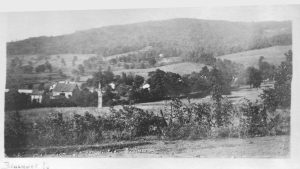
In 1962, Winifred (“Winnie”) Osburn Kelley, who grew up in the Bluemont area, was married in the living room of what is now my house, 33718 Snickersville Turnpike, in Bluemont. The house has really not changed much since those days. The picture of the bride coming down the stairs, or the reception in the dining room-living room area, or saying goodbye on the front porch could have been taken yesterday. I visited with Winnie in her home on Yellow Schoolhouse Road, where she lives with her husband William Kelley. All images are from Winnie Kelley’s albums
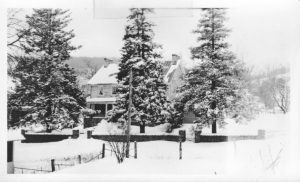
Susan: I was curious as to a little background on yourself, your mother and father. Could you tell me a little about them and where you did grow up?
Winnie: My mother and her family came here from West Virginia. They lost the farm in the Depression.
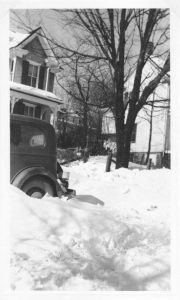
It was where Ralph Cochran had a dairy, off Foggy Bottom. They moved to Hillsboro. I guess mother was probably married at that time. She was postmistress of Bluemont for years. When she became ill she had to give that up—about 1948.
Susan: So she worked in the Lake Store Post Office with all the fancy pressed-metal mailboxes?
Winnie: Exactly. I have a photo of her standing out in front of it with one of the ladies that worked with her, Dorothy Wolford Harper.
Winnie: My uncle’s name was Wesley Carbaugh. He was my mother’s brother. He lived next to the [Bluemont United Methodist] church. The house used to be pink. Susan: How did your mother and father meet?
Winnie: I have no idea.
Susan. But were they both from around here?
Winnie: Daddy [Randall Harrison Osburn] was from the Bluemont area and when Mother’s family moved from West Virginia, of course. I guess she got the Post Office. He was much older than Mother. Actually, he was 63 when I was born.
Susan: Let’s see now. Your father kept the store…
Winnie: Yes, but not the main store. Aunt Freddie [Winifred Simpson Osburn Foerster,
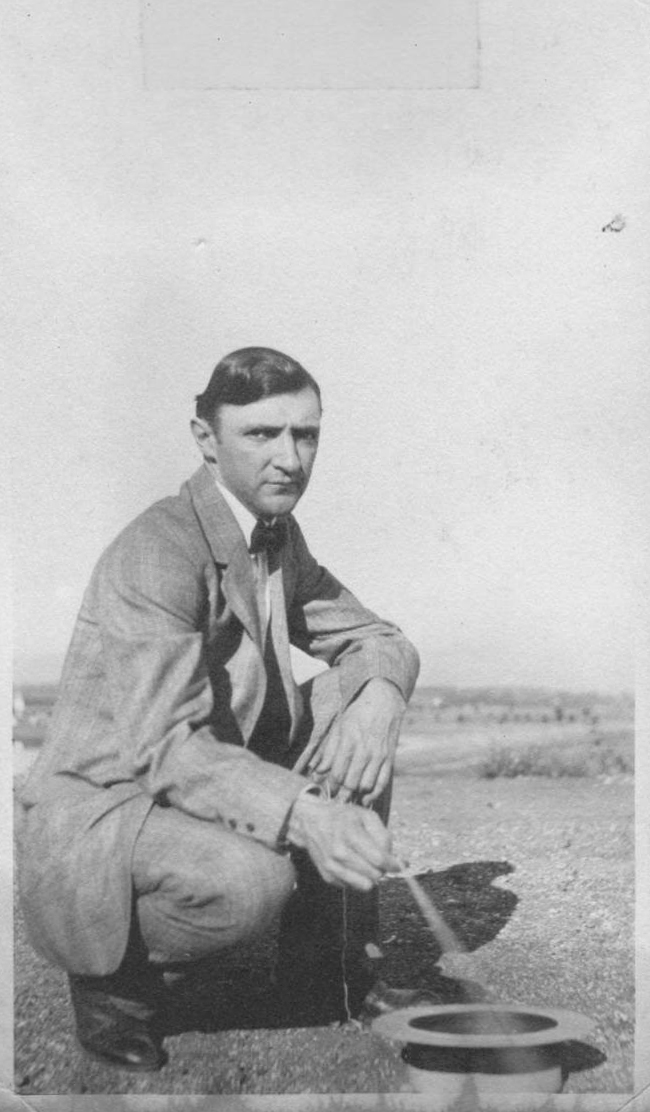
(1883-1968)] had the main store. Daddy didn’t keep it for long—not as long as Aunt Freddie kept hers. Aunt Freddie had what they call the Snickersville General Store. That’s what she had. Daddy was just down the road in the E.E. Lake store—that is, the building. At one time they had painted on the window “Osburn Cash Grocery”—that was years ago. I didn’t have any brothers and sisters. I was the only child because Mother was 40 when I was born. And I was born at my grandmother’s house in Hillsboro. No hospital. But Mother got sick when I was in first grade. So after that she had to go live with my grandmother; she was paralyzed for a while. Aunt Freddie took care of her at first. There was a room off the dining room in the house, in the back. That’s where mother recuperated, in that room.
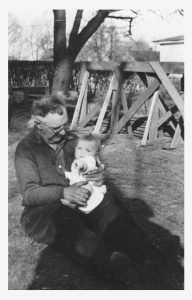
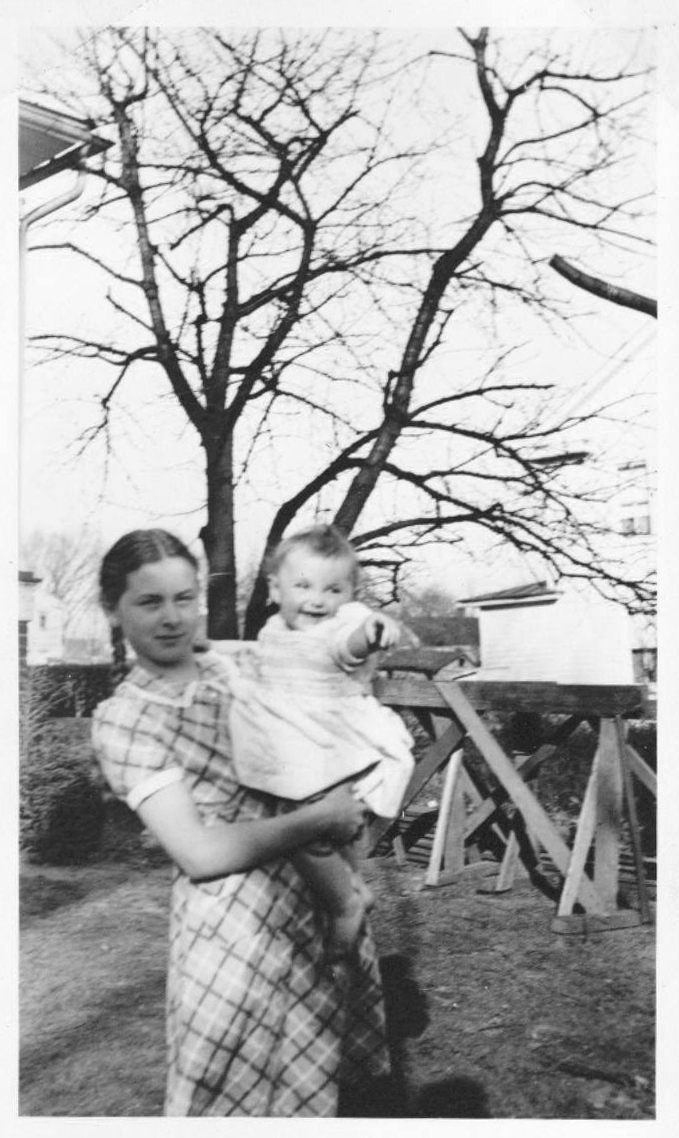
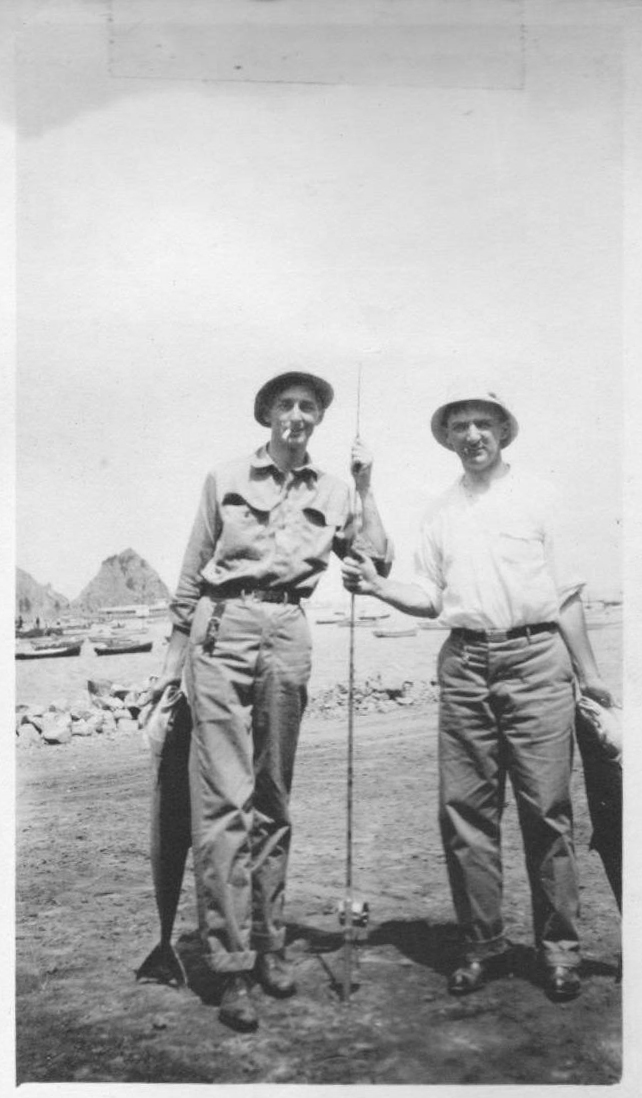
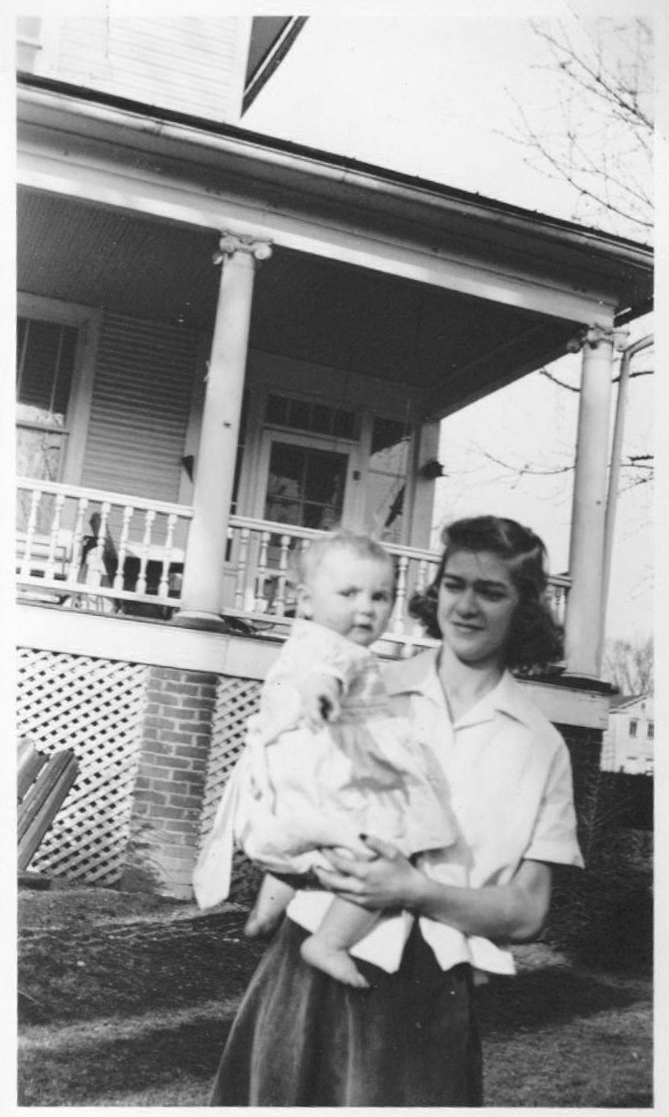
Susan: Was it a stroke?
Winnie: Stroke and a heart attack at the same time. Can you believe, she never went to the hospital. Aunt Freddie took care of her. And then in about September—this happened May or June that she got sick—in the store—she fell. Then in September, we went to live at my grandmother’s in Hillsboro. And Daddy stayed in Bluemont, living with Aunt Freddie. They got along just like brothers and sisters do (laughs).
Aunt Freddie slept in the larger bedroom, upstairs at the back of the house. When Winnie’s father lived there he slept downstairs, in the little room off the dining room in the back (today the laundry room), “probably because he couldn’t get up the stairs.” The front upstairs bedroom was the guest room where Winnie would stay.
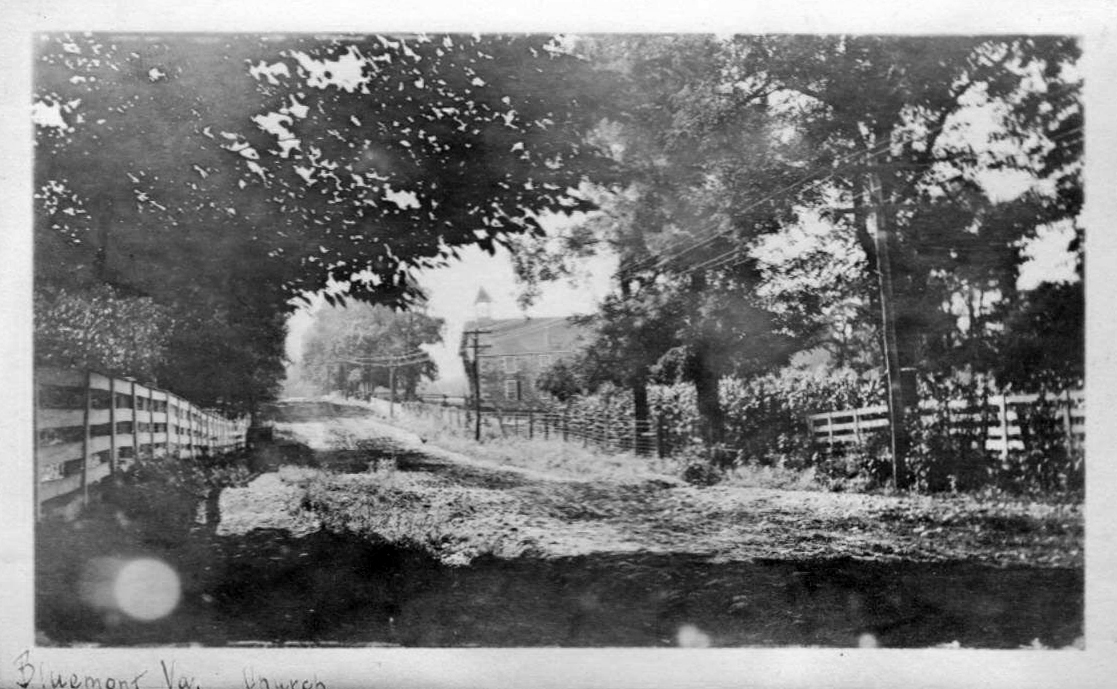
Susan: You said that that you spent summers in Bluemont?
Winnie: Every other weekend. Once we went to live with my grandmother I’d come every other weekend to see Daddy. My mother didn’t drive, and wouldn’t have been able to even if she’d had a permit. Aunt Freddie would come to get me on Friday afternoon.
Dad went to live with Aunt Freddie when I was in the 3rd or 4th grade. Mother tried to come back to live in Bluemont but she just couldn’t make it on her own. She was unable to. She didn’t have to have constant care, but there was just so much that she couldn’t do. She couldn’t do much housework, couldn’t cook, and I think my grandmother felt better with her at home.
Susan: When did your mother pass away?
Winnie: In 1965. Daddy died in 1963, Aunt Freddie died in about 1977 or maybe earlier, in a nursing home there at the end. She said she wouldn’t move in with any of her relatives because: “No home is big enough for two families.” She was very independent. And I guess she had to be.
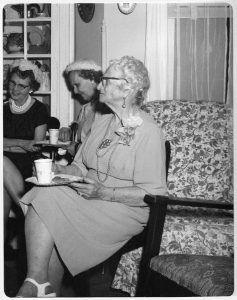
Winnie: Aunt Freddie—she was a liberated woman long before they invented the word. She was something, I’ll tell you. Her husband died in ’32, so she was a widow that whole time. But she made her own way. And she never remarried. She sewed some, and she went to DC. I think that’s when she was a seamstress. But she came back. In fact, she was a practical nurse. She kept older people in her home, upstairs. And she always said the men were easier to take care of than the women. (laughs) Maybe because she had no children of her own, she sort of mothered all the girls in town. Back then they were so frugal. You know, they didn’t have anything much extra. But she was good with a hammer and she fixed things herself. Of course, she didn’t do the plumbing or anything.
Susan: I can picture her doing all that.
Winnie: She was something, I’ll tell you. And she had the store—but I don’t know the years that she had the store.
Susan: She took the Bluemont Store for a while?
Winnie: Yes. But probably at the same time that my Daddy had a store right down the road. You know, where the E.E. Lake building is? My Daddy had a store there for a little while. Multiple rooms, I don’t know how many rooms. It was after the Post Office moved out, I guess because the Post Office was in there originally.
That’s when my mother was a postmistress or whatever they called it back then. Mother’s name was Oneda Carbaugh Osburn. Daddy joked we took the easy way when we spelled our name, dropped the “e” from Osburn. There are two or three different ways to spell it.
Susan: Well, Osburn is one of the oldest families in Bluemont.
Winnie: Yes, it is. But you know, sad to say, I didn’t get any of that information from Daddy or Aunt Freddie. Aunt Freddie was an Osburn—my Daddy’s sister. As kids, you don’t think about asking questions.
Winnie Kelley – Wedding in Bluemont Village
Winifred Irene Osburn married William (Bill) Arthur Kelley on May 30, 1962, at the home of Winifred Osburn Foerster in Bluemont. Bill Kelley was a dairy farmer for much of his career. About 37 people attended, including several children. Judy Anderson, whose name appears more than once in Winnie’s narrative, signed the guest list with her husband Buddy. Robert H. Garner officiated and Winifred O. Foerster signed as one of the witnesses.
Winnie: It was the hottest day, May 30, 1962. Traditional Memorial Day. It was so hot that day, oh my gosh.
Susan: But in these pictures, you look cool as a cucumber.
Winnie: We did. But I don’t know how. I know it was hot.
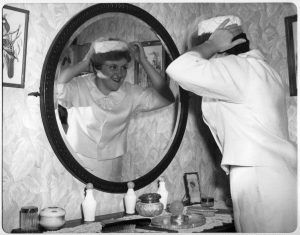
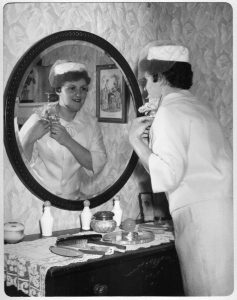
Susan: What happened first? How did you arrive at the house?
Winnie: Oh my gosh. I guess I came from Hillsboro that morning. I don’t think I spent the night there. At that time Daddy was in the hospital—happened in, like 1961. They called it hardening of the arteries then. It was something like Alzheimer’s, but maybe not quite as severe.
Susan: Do you remember what time of day the wedding was?
Winnie: It was afternoon, probably 2:00. Don’t know why we decided to get married in Aunt Freddie’s house.
When we got married Bill’s family lived in Airmont. But he grew up, and went to school in Richmond.
Susan: Did Aunt Freddie play wedding music?
Winnie: No, she didn’t. I don’t think we had any music. I’m trying to remember. You know she had her piano sitting right there as you come down the stairs. There’s enough room? That’s where she had her piano. Mother ordered the cake from Schmidt’s Bakery, the bread company. It had three layers with little bride and groom on top.
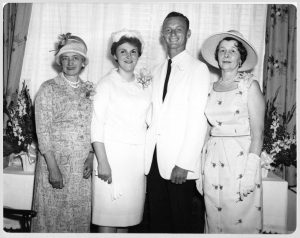
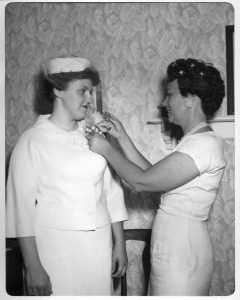
Susan: Your husband looks so young.
Winnie: He gained a little bit of weight after we got married. He was very thin when we got married.
Susan: This is Aunt Freddie, here with the corsage, sitting on the settee.
Winnie: She loved to get dressed up. I think she kind of rearranged the house a little bit for the wedding. We were married in that front room there where the double windows are. This is the dining room with the china closet.
Susan: Was your mother able to be there?
Winnie: Yes she was. My Daddy couldn’t be there but my mother was. And this is her mother [Winnie’s grandmother]. And this is Bill’s mother. She had pretty much gotten the use back of her left side. Only her speech was a little impaired. Really when you think about it, not having any medicine or anything, it was remarkable that she lived.
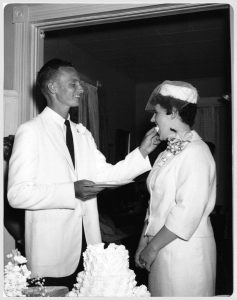
Susan: And did you have children?
Winnie: One. A son, Lance Foerster Kelley, he works in Leesburg. He lives in Round Hill, divorced. We see his daughter Lauren Kelley every other weekend. She is very much of a joy, I’ll tell you. She is a neat kid. She is 11.
Susan: So when would you have known Bluemont best? In the mid- to late-1950s?
Winnie: From ’50 on to about when I got out of high school. Every other weekend. Is there still an old chicken house behind your house? That’s where the girls in Bluemont, that’s where we had our clubhouse. A chicken house. There weren’t any chickens in it. I think there were just had four members. We probably had a name, but I couldn’t tell you what it was.
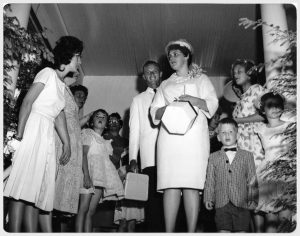
Judy Anderson was one of them. She lived in the first house on Rail Road Street. One of the girls—Bonnie Smith—is 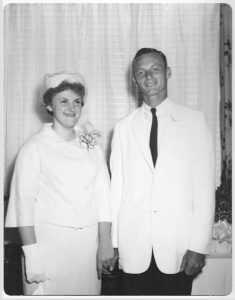 deceased. She lived across the road with grandparents Frank and Mary Kerrick. He was a mail carrier when mother was postmistress. Bonnie was a Smith, and she married a Reid. Connie Smith was Bonnie’s sister. And maybe Emily Reid—not real sure about Emily. She lived next door to Judy, who lived in the first house up from the EE Lake store. I can’t remember how often our club met. Probably just when we wanted to get away. And I think we probably had a password and all that. You know, you didn’t want any boys in. [laughs]
deceased. She lived across the road with grandparents Frank and Mary Kerrick. He was a mail carrier when mother was postmistress. Bonnie was a Smith, and she married a Reid. Connie Smith was Bonnie’s sister. And maybe Emily Reid—not real sure about Emily. She lived next door to Judy, who lived in the first house up from the EE Lake store. I can’t remember how often our club met. Probably just when we wanted to get away. And I think we probably had a password and all that. You know, you didn’t want any boys in. [laughs]
Susan: How old were you?
Winnie: Probably we were in grade school. I went to work for the Department of Agriculture in 1960. I was recruited at high school. I was so thrilled to have a job like that, right out of high school. Judy Anderson worked for USDA also. She commuted most of the time. She worked two years, riding with a husband and wife who worked at Agriculture. They were assigned a parking place, which made it pretty nice. That makes a difference. We picked up somebody in Falls Church. Judy went to DC with me to live and left before I did. For six months I lived at 1616 16th Street with roommates from Tennessee. One was named Sue Horstkamp and we still correspond. She lives in Annandale. I got married after 2 years of working for the USDA.
Susan: Did Bluemont look a lot like it still does?
Winnie: Yes. To me it does, anyway. Where Cochran’s Lumber Company was, that’s all changed. Not the original building, but the new sheds that were put up beside it. And then the new post office, of course.
Mother went from the EE Lake store to the little building. In fact Judy Anderson’s mother was post mistress for years. I’m not sure when she started either. I don’t know if it was right after Mother or if there was somebody in between there.
Susan: And of course, the church was there.
Winnie: Aunt Freddie was the organist at the [Bluemont United Methodist] church, or rather the piano player. She didn’t take piano lessons until she was 40 years old, but she did play piano at church. Daddy didn’t go to church much, but Aunt Freddie always saw that I went. And then when I was at Hillsboro, I went to Hillsboro Methodist Church.
Susan: Were there many relatives in Bluemont?
Winnie: Of mine? Not really. Aunt Freddie, and Daddy, and Mother. My grandmother, you know, had moved to Hillsboro—that was in 1933 or whenever they lost the farm.
My aunt & uncle worked for Mr. Pierot, his place was on the hill above Great Country Farm. Wesley worked for him for years and years. And when he retired that’s when he built that house there [in Bluemont]. It was on the foundation of another house that had burned down. The “Pink House.” Most of ‘em not very far away, Purcellville, etc., Loudoun or Berryville. Someplace close.
Susan: So there’s still something of an Osburn clan here.
Winnie: Probably. Sad to say I don’t know any of ‘em. So I guess they are distant relatives. The ones I knew are all deceased. Daddy doesn’t have anyone left on [on his side)]. Just this one niece, Geraldine James. And she’s not an Osburn—she’s married to Robert James whose mother was an Osbourn.
Winnie Kelley – On the merits of donkeys
Winnie: I keep twelve donkeys, some standard, some miniature. I had sixteen at one time. They have Biblical names:
Hanna
Rebecca
Tabathia Cloe
Naomi
James
Daniel
Joshua (a standard)
Donkeys are good companions. You can put them with sheep, race horses. I sold two of my babies to a lady with horses to teach her animals manners. You can break an animal to lead using donkeys. They are really low-maintenance animals. They need their hooves trimmed, and that’s about it. They are not prone to disease. They are neat, neat animals. I’ve had them 10 or 12 years. We moved here eight years ago from North Fork, outside of Philomont, and brought my original herd with us. I’m hoping for babies, but you can’t tell with donkeys. Five of them were with the Jack. I didn’t breed any of the standards because they are a little hard to handle, even though Joshua is a standard and he is just the sweetest thing. Naomi is barren. If I have another girl, I have the name picked out. I’m going to name her Esther.
